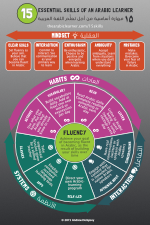Accept Ambiguity.
Accept ambiguity in your conversations and interactions in Arabic. Being able to accept and be comfortable with situations in which you do not understand everything that is being said to you (or written) is essential to learning Arabic. Having the flexibility to be able to adapt to input that is slightly beyond your ability to fully grasp will stretch you and cause you to apply internal learning strategies that advance your language skills.
This article is based on the 15 Essential Skills of an Arabic Learner.
An unfortunate scenario of not understanding everything
“Thank you very much for your offer, but for this daughter of yours, a thousand pounds would never be enough!” Setting aside the thorny issues of arranged marriages, finances, and power relationships in families in a conservative society, this sentence probably signifies the high water mark of my Arabic language blunders. It shows how awkward it can be to not understand everything being communicated around you in Arabic.
I was visiting a village in southern Egypt. I was young and thought I knew a lot of Arabic. While being introduced to the extended family of my friend I was staying with, they told me with a smile that they wanted me to marry into the family so I could stay with them forever. Arranged marriages are common in village life. I knew enough to realize that they weren’t serious, but rather were just paying a compliment to me. That compliment being, if I would pay 1000 Egyptian Pounds, I could marry their daughter Fatma. She was sitting in the room with us at the time, looking as awkward as I felt.
ممكن تدفع ألف جنيه
Mumkin tidfa3 alf guineeh…
(you can pay 1000 pounds…)
Unfortunately, rather than do the safe thing and just laugh and not really respond, I decided to be clever with my Arabic. “Thank you very much for your offer, but for this daughter of yours, a thousand pounds would never be enough!”
بالنسبة لبنتكو دي, ألف جنيه قليل جدا
…Alf guineeh ‘ulaayil giddan!
In my defense, I was trying to build up Fatma’s self esteem.
The only problem was, they hadn’t actually said ممكن تدفع ألف جنيه (mumkin tidfa3 alf guineeh)… “you can pay 1000 pounds”.
They had said ممكن ندفع ألف جنيه (mumkin nidfa3 alf guineeh)… notice the “N” in NIDFA3. Which means “WE can pay 1000 pounds”. As in, we’ll pay you a thousand pounds to marry our daughter. Clever me.
Parents: “We will pay you 1000 pounds to marry our daughter and stay with us”
Me: “For this daughter of yours, a thousand pounds would never be enough!”
My friend explained to me later why the people in the room (especially Fatma) did not seem appreciative of my witty response…
Ambiguity – not understanding everything
There are many situations as you learn Arabic where you will not understand everything that is going on. Whether it is spoken or written Arabic, our tendency is to want to avoid moving forward until we fully understand the material we are interacting with. We are not comfortable with ambiguity.
However, needing to know everything before you feel ready to move forward will actually slow down your learning. Being in situations where you are pushed beyond your current full understanding will cause you to adapt and stretch in your Arabic. And that will increase the pace of your learning. Even if – and perhaps especially if – you make mistakes along the way. The old adage “we learn from our mistakes” is actually true, and I’ll look at that in more depth in next week’s blog post.
In the 1980s, Steven Krashen – a linguist from the University of Southern California – became well known for his Input Theory, in which he stated that second language learners improve and progress when they receive language input that is one step beyond their current level. This is often referred to as the ‘i+1’ theory. Although I would not say I am fully convinced of everything Krashen writes, I think that this point is really helpful. We learn when we are pushed by input that is a bit beyond our current level.
We learn by embracing ambiguity and taking risks. The risk is that we will misunderstand some of what is being communicated to us, and may end up feeling foolish. We may have to backtrack and fix things that we break (I still wonder to this day what Fatma thinks of the young Canadian who insulted her). But in the end, our fears of what might go wrong are almost always proven wrong. The disasters we imagine do not actually happen. The shame we imagine at being exposed in our weak Arabic does not turn out to be that bad. We begin to learn at a faster pace.
“Students need to be alright with ambiguity…if the student is of the type that has to know or understand everything before they feel comfortable or safe, they will be extremely slow in progressing, if they progress at all.[1]” (Dr. Aiyub Palmer)
Here are five ways you can learn in situations where you don’t fully understand the Arabic you are interacting with:
1. Fake understanding
They need to be able to fake understanding, be willing to fake a conversation with an Arabic speaker, and try to understand the input[2]. (Dr. Aiyub Palmer)
If you do not understand everything that is being said (or written) in a conversation, fake it. Pretend that you understand.
This is important, because if you don’t fake it the person who is interacting with you will change the way they are interacting with you. They will slow down to accommodate you, and once that happens, you are no longer functioning in “normal” Arabic (note that Arabic that is slowed down for pedagogical reasons does have its place, and I will discuss that in future posts, but it is important that this be balanced with authentic input that is not altered for the learner).
Keep the conversation rolling by faking that you understand.
Note that this is probably good advice for “low-stakes interactions”. Don’t fake understanding when the stakes are high, such as negotiating a financial contract, getting married, or committing to a new job!
2. Extract what you do know
Be able to handle ambiguity. Everything will not make sense at the beginning, but you will know some things here and there. You can reach a level of functioning, and still have much you don’t know. Be OK with that, and continue to learn bit by bit in an eager and excited way[3]. (Dr. David Wilmsen)
Handling ambiguity means being comfortable with not understanding everything, and it also means focusing and extracting the things that you CAN pick out from each interaction.
This is important. For me, it is easy to check out of a conversation in Arabic when I don’t fully understand it. It takes effort to keep focusing on what is being said, and piecing together the conversation as best I can from what I do understand. When I do this, I learn.
3. Laugh at yourself
Relax and enjoy yourself. It’s really not a problem when you get exposed for not understanding what is happening.
I find that my sense of self-worth can feel strangely diminished when I perceive (correctly or incorrectly) that people are laughing at me. As if my value lies in somehow being able to perfectly use a language that I am learning. In my more rational moments, I am proud of being a learner, and enjoy allowing other people to play a role in my progress in Arabic by bearing witness to my noble, confused attempts to use it.
4. Follow my previous advice
In my previous posts, I talked about three other important mindsets: aiming for fluency, committing to interact, and being enthusiastic. Each of these has a direct role to play in handling ambiguity. If you didn’t get a chance to read through those posts, take a look over them now.
Accept ambiguity. Be at peace with not understanding everything. It will accelerate your Arabic learning.
Homework
- Think of a situation in which you did not understand everything taking place in an Arabic interaction. Did you learn anything from this situation? Did you lose anything?
- Take a minute to assess how you normally respond to situations where you don’t understand everything being spoken or written in Arabic. Do you insist on understanding everything? Or do you continue with the interaction and learn what you can? How can you become more comfortable with ambiguity?
[1] Personal interview with Dr. Aiyub Palmer, May 21, 2015
[2] Personal interview with Dr. Aiyub Palmer, May 21, 2015
[3] Personal interview with Dr. David Wilmsen, April 28, 2015



 RSS - Posts
RSS - Posts
One thought on “Ambiguity: Four ways you can learn from not fully understanding Arabic”
Comments are closed.